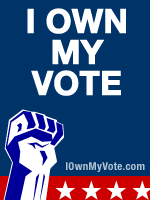What is it in this article from Ghana, about our presidential campaigns that makes sense_ besides the need for good editing?
COLUMN
12 May 2008
Posted to the web 12 May 2008
Godwin Yaw Agboka
"Hillary Clinton has vowed to fight on, even though the odds are hugely against her.
She is behind Obama in popular votes, pledged delegates, and states won. What is more, more than ever, pressure is mounting on her to withdraw her candidature from the Democratic race to save the party from a chaotic convention due to take place in Denver later this year.
Last Tuesday was an apt opportunity for Hillary to prove to the superdelegates and the leadership of the party that Obama is, indeed, vulnerable; that several questions remain unanswered about Obama; that Obama does not connect with middle class, blue-collar workers; that he cannot win the big states, and that he is elitist. This point, she could not make at the end of the primaries in Indiana and North Carolina. When the votes were counted, Obama won North Carolina by a 14-point margin in North Carolina, and, almost denied Hillary victory in Indiana, where the demographics favored her.
Let's face it; Hillary Clinton has run a terrific campaign. She began the race as the most established, experienced, and most formidable brand. She was-before the process-and still is, the most popular woman in the US. She had the Clinton machinery well in place for her, and she made good use of it. Consequently, during the debates, she stayed above the fray, refusing to answer some questions, and always presenting herself as the candidate for the '08 campaign. She led by huge margins in most of the states, according to most of the polls- even before some of the other contenders dropped out.
Hillary's tragic mistake was that she ran a general election campaign-not a campaign to win her party's nomination. She presented herself as the invincible candidate destined to go to the White House. Thus, while Obama was amassing grassroots support, soliciting as little as a dollar from donors, Hillary was already living the life of a president. Thus, as Obama developed into a movement, the Clinton machinery could not rise to the challenge.
It was stunning how the Illinois Senator, Barrack Obama took the Democratic race by storm. He won ten contests in a row after Super Tuesday, picked up high profile endorsements, and closed the gap in the number of superdelegates won. He looked unstoppable after Super Tuesday, and, as things stand, he has ruggedly broken the aura of invincibility around Hillary Clinton, and provided tough answers to the question of electability, raised by Hillary Clinton.
Obama appears to have a magic wand that appeals to the youth, independents, and liberals. For the first time, in many decades, the expectations, among voters, are reaching boiling point-call it a crescendo. Voters seem to want things to change in Washington. Obama represents the change they want. Forget about the fact that he is black. Obama has transcended race. He talks about hope, and believes that "there is nothing false about hope." He knows how to say the right things at the right time.
Mathematically, it is impossible for Hillary to get the Democratic nomination. The only hope she has is to court (and win over) superdelegates, who are the tie-breakers in the Democratic process. Unfortunately (maybe, for Hillary), there is no tie in this case. The problem with allowing the superdelegates to decide the winner of the race, especially now that Obama has a huge advantage is that it will be a recipe for rancor, animosity, and division in the Democratic Party. It will be a disaster! That will be against the will of the people who voted, en masse, for Obama. Don't forget, also, that the many blacks who have turned out for Obama will feel the nomination has been 'stolen' from them. Blacks are a core voting group for Democrats.
Obama currently leads in pledged delegates and in states won and he is ahead in the popular vote, even if Florida were factored into the equation. Votes from Florida and Michigan were not counted because the states were penalized for moving their primaries up in violation of party rules. Thus, all the aspirants agreed not to contest there, even though Obama's, Clinton's, and Kucinich's names were on the ballot in Florida. In Michigan, however, Obama's name (and those of the other candidates), except Clinton's, was not even on the ballot.
Obama has won a total of 1,846 delegates out of which 1,588 are pledged delegates and 258, superdelegates. Clinton has won a total of 1, 685 delegates, out of which 1,419 are pledged delegates and 266, superdelegates, but a candidate will need a total of 2,025 to clinch the nomination. Furthermore, Obama has won twice as many states as Hillary. However, neither candidate is expected to win the 2,025 delegates needed to clinch the Democratic nomination by June 3, the end of the primary season. The final decision will most likely fall to the 796 superdelegates who are Democratic governors, members of Congress and party officials. That is where Hillary wants to cash in.
Even if Hillary Clinton won the remaining six contests, she cannot make up the difference (in delegates) between her and Obama, because the number of delegates for pick up is not as huge as it was in (say) Pennsylvania or even North Carolina. In fact, for Clinton to come close to closing the gap, she needs to win about 70% of the popular votes in all the other contests-a task which is impossible. Unfortunately for her she is about 500,000 votes behind in popular votes.
However, even though the odds are against her, Hillary believes she can still pull a surprise; in fact, she wants to re-live or re-enact the story of her husband who staged a major comeback after he lost Iowa about sixteen years ago when he was seeking the Democratic nomination. The challenge Hillary faces, however, is that she's had a lot of comebacks in this race-New Hampshire, Massachusetts, etc-but the odds have always been against her. She can't simply catch up!
The New York Senator makes an argument about why she is more electable. She argues that she has won the bigger states that matter to Democrats: California, Nevada, Arizona, New Mexico, Texas, Oklahoma, Arkansas, Tennessee, Ohio, Pennsylvania, New York, New Hampshire, Massachusetts, Rhode Island, New Jersey. In fact, no Democrat became President without winning Ohio, Pennsylvania, and Florida. These states have a lot of blue-collar workers who have been behind the pockets of successes Hillary Clinton has chalked in this process. Obama has failed to connect with these voters, and has often performed poorly whenever these voters come into the equation. He has won more of the small states which are also swing states.
What is more, recent polls about how the Democrats will fare against McCain have shown that, in fact, Hillary Clinton will beat McCain in a general election match-up by about 5 points, while the match-up between Obama and McCain is statistical dead heat. What these polls fail to do, however, is that they can't project into the future. They can only show the present. Is voter behavior static? Can't voters change their minds? Also, if Hillary argues that she is more electable, what is the best assessment of electability? Isn't Obama beating Hillary in the current process? Who is more electable?
The point the Clinton campaign misses, even regarding blue-color voters, is that these blue-collar voters who have been the backbone of Hillary Clinton have traditionally voted for Republicans, so that is not necessarily an Obama problem. It is a problem Democrats have had, and still have. Democrats have always struggled with this group of voters in the general elections. Thus, it is not a given that these voters will vote for a Democrat in the general elections.
The challenge Democrats face with this long, drawn-out process is that the White House might elude them. Even though the race has brought as much excitement to Democratic voters, it is also dividing the party. The Republican nominee, John McCain is already running a general election campaign, while the Democrats tear each other part. If recent polls about reports of division within the Democratic Party are an indicator, the Democrats are in big trouble.
According to early exit polls, half of Clinton's supporters in Indiana would not vote for Obama in a general election matchup with Sen. John McCain, the presumptive Republican presidential nominee. A third of Clinton's voters said they would pick McCain over Obama, while 17 percent said they would not vote at all. Forty-eight percent of Clinton supporters said they would back Obama in November.
Obama got even less support from Clinton backers in North Carolina, where 45 percent of Clinton supporters said they would vote for him over McCain. Thirty-eight percent of Clinton supporters said they would vote for McCain while 12 percent said they would not vote. It appears Obama voters appear to be more willing to support Clinton in November. In Indiana, 59 percent of Obama backers said they'd vote for Clinton, and 70 percent of Obama backers in North Carolina said vote for her against McCain.
It will be difficult, if not impossible, for Hillary Clinton to clinch the Democratic nomination. It's almost over for her! Obama looks poised to become both the nominee and the first black president of the United States. He has one foot there, and he should be worrying over who will partner him for the December elections. The best Hillary Clinton can do is to graciously quit the race to save the party, her image, and to brighten her chances towards the pursuit of her political career. It is as simple as that!"
When my first choice for president Dennis Kucinch dropped out of the race, I vowed to stay in behind Hillary all the way to the primaries. Once Thomas Friedman's article was published in the NYT, I found myself doing some digging and research on line to better understand what he was plainly saying. It was then, about ten days ago that I found myself beginning to waver, to the extent that I posted my own call for Hillary to call the race, and drop out.
Today, with my Oregon ballot in my hand, I am really stuck in my decisions, for whom to vote!
Monday, May 12, 2008
Ghana: Is the Dream over for Hillary Clinton?
Posted by
la fin du siècle
at
1:25 PM
![]()
Labels: Hillary, Obama, US democratic presidential campaign
Subscribe to:
Post Comments (Atom)





























No comments:
Post a Comment